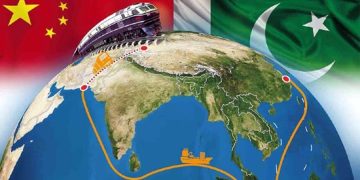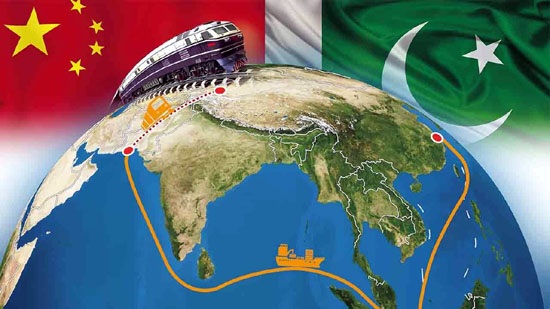China Pakistan Economic Corridor (CPEC) has instrumental force for rapid social development in the country in terms of education, housing, qualitative human capital development, health and shelter. It is X-factor in achieving the desired goals of the UN Millennium Sustainable Development Goals (SDGs) in the country.
Moreover, the Sustainable Development Goals (SDGs) is an important part and parcel of Pakistan’s development policy aiming of eradicating poverty and uplifting the socio-economic conditions of the general masses.
The SDG 4, relates to quality education for both boys and girls, was adopted as a ‘priority goal’ by the Government of Pakistan. However, attainment of SDG 4 has yet been achieved because of many complex and complicated reasons. If it is achieved it can start socio-economic welfare and uplifting of people and communities alike in the country.
The SDG report (2021) shared that it SGD 4 has remained stagnant overall with the national literacy rate remained at 60 percent from 2015 to 2020. There is an urgent need to chalk out a holistic and comprehensive policy to ensure quality education for all across Pakistan. In this context, current financial crisis of Pakistan is one of the main hurdles to achieve this goal but however, easy and smooth completion of CPEC Phase I & II may provide vital imputes for achieving this goal of SGD4 in the country.
Comparative study reveals that the education sector in Pakistan is faced with multiple problems ranging from gender gap in the ratio of school enrolment for both boys and girls to the availability and utilisation of funds for running various schools, colleges and universities.
Moreover, lack of technical training at the college level for ensuring employment after degree completion, presence of thousands of ghost schools with ghost teachers, lack of training for teachers associated with both the private and public educational institutions, and the resultant appalling standards of education are just a few of the major issues that Pakistan’s education sector currently faces which may be ratified with the increasing mutual educational cooperation under the flagship projects of CPEC in the country.
In this regard, many education centers, technical institutes and universities are busy to sign meaningful MOUs and agreements for education and culture cooperation between the both states and private companies alike.
There is an urgent need to accelerate socio-economic development with the development of CPEC projects. CPEC is a $65 billion mega project which has entered its second phase. In its ongoing second phase, the project will mainly focus and emphasis upon the education sector in Pakistan, like opening of technical education institution and initiating and strengthening student exchange programs.
More focus should be given on the construction of new schools, technical and vocational training centres, and higher education institutions while at the same time upgrading the old ones under the flagship project of the CPEC in the country.
It is obvious that if connected with SDG 4, CPEC may help to enhance the quality of education across Pakistan. While working on the attainment of SDG 4, the incumbent government has tried to facilitate provincial governments to improve the recruitment of teachers and student enrolment ratios, especially with regard to girls, for improving the overall literacy rate of the country.
In addition to this CPEC has also worked in the same direction, where the need for better technical education facilities was realised in remote areas like Gwadar and FATA. As of now, 25 solar schools have been set up to help facilitate the local communities in both the provinces in the country.
It is suggested that for successful implementation and attainment of SDG 4 or as part of the CPEC project for promoting better education facilities should be completely synchronised with each other. If the money and resources, which have been spent separately, are combined, it would not only strengthen the resolve to promote quality education but it would also prove to be cost effective. There should a complete road map for this goal.
In this regard, insurance of free primary education, the emphasis upon promotion of girls’ education, prioritising IT and other technical skills, and promoting the culture of research and development should be foremost priority of the government.
Hopefully, with the increasing inflation and high poverty rates, free primary education can bring respite to the large swathes of population who cannot afford to send even a single child to school. The construction and upgradation of primary schools with basic services such as the availability of the books and stationary should be mandatory in the vicinity of all CPEC projects, and the outcome of such initiatives should be counted in the attainment of SDG 4.
CPEC has mainly focused on promoting technical and vocational training to meet the requirements of projects in various fields such as energy, transportation and infrastructure by building a localised skilled labour force.
Now time has come to associate the gains from such initiatives with the attainment with SDG 4 as well which can be further broadened to expand on research and development component in higher education institutions a field relatively neglected in the domain of Pakistan’s socio-economic and development policies.
Moreover, the CPEC-SDG collaborative mechanism should focus on the fields of information technology and climate change areas that have huge employment potential for the youth. The women should be given incentives and special attention in CPEC projects and there should be a special quota for female students in technical and vocational schools. They should be given priority in any employment opportunity created under CPEC.
To conclude these small but integrated initiatives can easily further enhance productivity levels of education sector in the country. CPEC is the life line of social development in the country and hope of prosperous future.
CPEC Phase-II should focus on women empowerment, equal employer concept, technical education, higher education, exchange of scholars, formation of corridor of knowledge, collaboration in research and scholarship. Social development is the way forward and successful model of eradication of poverty, generation of new jobs and last but not least, attainment of qualitative life in the country. Thus amalgamation of CPEC with SDGs 4 is the need of hour and only way forward to lessen miseries in the country.
- Latest
- Trending






